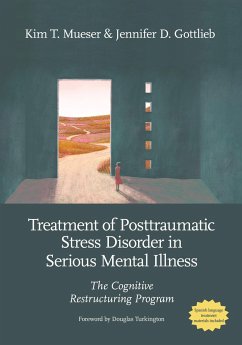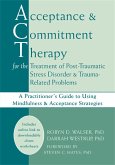Kim T. Mueser, Jennifer D Gottlieb
Treatment of Posttraumatic Stress Disorder in Serious Mental Illness
The Cognitive Restructuring Program
Kim T. Mueser, Jennifer D Gottlieb
Treatment of Posttraumatic Stress Disorder in Serious Mental Illness
The Cognitive Restructuring Program
- Broschiertes Buch
- Merkliste
- Auf die Merkliste
- Bewerten Bewerten
- Teilen
- Produkt teilen
- Produkterinnerung
- Produkterinnerung
A practical guide to the evidence-based cognitive restructuring for PTSD treatment, designed to meet the needs of people with serious mental illness.
Andere Kunden interessierten sich auch für
![Women with Serious Mental Illness Women with Serious Mental Illness]() Lauren MizockWomen with Serious Mental Illness71,99 €
Lauren MizockWomen with Serious Mental Illness71,99 €![Posttraumatic Abortion-Related Stress in Psychiatric Outpatients Posttraumatic Abortion-Related Stress in Psychiatric Outpatients]() Rachel L AndersonPosttraumatic Abortion-Related Stress in Psychiatric Outpatients13,99 €
Rachel L AndersonPosttraumatic Abortion-Related Stress in Psychiatric Outpatients13,99 €![When Someone You Love Suffers from Posttraumatic Stress When Someone You Love Suffers from Posttraumatic Stress]() Claudia ZayfertWhen Someone You Love Suffers from Posttraumatic Stress16,99 €
Claudia ZayfertWhen Someone You Love Suffers from Posttraumatic Stress16,99 €![Acceptance and Commitment Therapy for the Treatment of Post-Traumatic Stress Disorder and Trauma-Related Problems Acceptance and Commitment Therapy for the Treatment of Post-Traumatic Stress Disorder and Trauma-Related Problems]() Robyn D WalserAcceptance and Commitment Therapy for the Treatment of Post-Traumatic Stress Disorder and Trauma-Related Problems53,99 €
Robyn D WalserAcceptance and Commitment Therapy for the Treatment of Post-Traumatic Stress Disorder and Trauma-Related Problems53,99 €![Posttraumatic Stress and Substance Use Disorders Posttraumatic Stress and Substance Use Disorders]() Posttraumatic Stress and Substance Use Disorders151,99 €
Posttraumatic Stress and Substance Use Disorders151,99 €![Handbook of Posttraumatic Stress Handbook of Posttraumatic Stress]() Handbook of Posttraumatic Stress118,99 €
Handbook of Posttraumatic Stress118,99 €![Psychological Assessment of Adult Posttraumatic States: Phenomenology, Diagnosis, and Measurement Psychological Assessment of Adult Posttraumatic States: Phenomenology, Diagnosis, and Measurement]() John BrierePsychological Assessment of Adult Posttraumatic States: Phenomenology, Diagnosis, and Measurement25,99 €
John BrierePsychological Assessment of Adult Posttraumatic States: Phenomenology, Diagnosis, and Measurement25,99 €-
-
-
A practical guide to the evidence-based cognitive restructuring for PTSD treatment, designed to meet the needs of people with serious mental illness.
Hinweis: Dieser Artikel kann nur an eine deutsche Lieferadresse ausgeliefert werden.
Hinweis: Dieser Artikel kann nur an eine deutsche Lieferadresse ausgeliefert werden.
Produktdetails
- Produktdetails
- Verlag: American Psychological Association
- Seitenzahl: 427
- Erscheinungstermin: 24. Dezember 2024
- Englisch
- Abmessung: 178mm x 254mm x 23mm
- Gewicht: 774g
- ISBN-13: 9781433841651
- ISBN-10: 1433841657
- Artikelnr.: 70158939
- Herstellerkennzeichnung
- Libri GmbH
- Europaallee 1
- 36244 Bad Hersfeld
- gpsr@libri.de
- Verlag: American Psychological Association
- Seitenzahl: 427
- Erscheinungstermin: 24. Dezember 2024
- Englisch
- Abmessung: 178mm x 254mm x 23mm
- Gewicht: 774g
- ISBN-13: 9781433841651
- ISBN-10: 1433841657
- Artikelnr.: 70158939
- Herstellerkennzeichnung
- Libri GmbH
- Europaallee 1
- 36244 Bad Hersfeld
- gpsr@libri.de
Kim T. Mueser, PhD is a professor in the Departments of Occupational Therapy and Psychological and Brain Sciences at Boston University. He has published over 400 peer-reviewed articles, 100 book chapters, and 15 books primarily on psychosocial treatments for serious mental illness (SMI), and has given numerous conference presentations, workshops, and invited lectures in the U.S. and abroad. Dr. Mueser began adapting empirically supported treatment methods for PTSD in the general population to the SMI population in the late 1990s, which resulted in the first standardization and feasibility testing of the CR for PTSD program in the early 2000s, followed by randomized controlled trials evaluating the program. Jennifer D. Gottlieb, PhD is a diplomate in the Academy of Cognitive and Behavioral Therapies whose work has been dedicated to the development, evaluation, and implementation of effective psychotherapeutic interventions for persons with severe psychiatric conditions. She is a founding member and former president of the North America CBT for Psychosis Network (NACBTpN) and is affiliated with the Cambridge Health Alliance/Harvard Medical School. In addition to numerous publications and presentations related to cognitive behavioral therapies for psychosis and other serious mental illness, Dr. Gottlieb has focused on the Cognitive Restructuring for PTSD intervention for over 18 years, as both a coinvestigator and a program development consultant. She has provided extensive workshop training, clinical supervision, and treatment fidelity evaluation to hundreds of clinicians and has worked with multiple mental health agencies, nationally and internationally to implement and sustain this intervention (https://www.jennifergottliebphd.com).
Foreword
Preface
Part I: Background and Overview of Trauma and PTSD in Serious Mental
Illness
Chapter 1. Trauma and PTSD in Serious Mental Illness
Chapter 2. Treatment of PTSD in People With Serious Mental Illness: The
Cognitive Restructuring Program
Chapter 3. Understanding and Assessing Trauma and PTSD
Part II: The Cognitive Restructuring for PTSD Program
Chapter 4. Logistics of Implementing the CR for PTSD Program
Chapter 5. Beginning Treatment: Engagement, Orientation, Wellness Planning,
and Breathing Retraining
Chapter 6. Psychoeducation and Goal-Setting
Chapter 7. Cognitive Restructuring I: The Thought-Feeling Model and Common
Styles of Thinking
Chapter 8. Cognitive Restructuring II: The 5 Steps of Cognitive
Restructuring and Action Plans
Chapter 9. Cognitive Restructuring III: Working With Trauma-Related
Thoughts, Core Beliefs, and Persistent PTSD Symptoms
Chapter 10. Solutions to Common Challenges
Chapter 11. Skill Generalization and Termination
Part III: Special Clinical Challenges and Populations
Chapter 12. Working With People With Psychosis
Chapter 13. Working With People With Borderline Personality Disorder
Part IV: Conclusion
Chapter 14: The Role of the CR for PTSD Program in a Comprehensive System
of Mental Health Care
Appendix: Clinician Tools and Handouts
References
Preface
Part I: Background and Overview of Trauma and PTSD in Serious Mental
Illness
Chapter 1. Trauma and PTSD in Serious Mental Illness
Chapter 2. Treatment of PTSD in People With Serious Mental Illness: The
Cognitive Restructuring Program
Chapter 3. Understanding and Assessing Trauma and PTSD
Part II: The Cognitive Restructuring for PTSD Program
Chapter 4. Logistics of Implementing the CR for PTSD Program
Chapter 5. Beginning Treatment: Engagement, Orientation, Wellness Planning,
and Breathing Retraining
Chapter 6. Psychoeducation and Goal-Setting
Chapter 7. Cognitive Restructuring I: The Thought-Feeling Model and Common
Styles of Thinking
Chapter 8. Cognitive Restructuring II: The 5 Steps of Cognitive
Restructuring and Action Plans
Chapter 9. Cognitive Restructuring III: Working With Trauma-Related
Thoughts, Core Beliefs, and Persistent PTSD Symptoms
Chapter 10. Solutions to Common Challenges
Chapter 11. Skill Generalization and Termination
Part III: Special Clinical Challenges and Populations
Chapter 12. Working With People With Psychosis
Chapter 13. Working With People With Borderline Personality Disorder
Part IV: Conclusion
Chapter 14: The Role of the CR for PTSD Program in a Comprehensive System
of Mental Health Care
Appendix: Clinician Tools and Handouts
References
Foreword
Preface
Part I: Background and Overview of Trauma and PTSD in Serious Mental
Illness
Chapter 1. Trauma and PTSD in Serious Mental Illness
Chapter 2. Treatment of PTSD in People With Serious Mental Illness: The
Cognitive Restructuring Program
Chapter 3. Understanding and Assessing Trauma and PTSD
Part II: The Cognitive Restructuring for PTSD Program
Chapter 4. Logistics of Implementing the CR for PTSD Program
Chapter 5. Beginning Treatment: Engagement, Orientation, Wellness Planning,
and Breathing Retraining
Chapter 6. Psychoeducation and Goal-Setting
Chapter 7. Cognitive Restructuring I: The Thought-Feeling Model and Common
Styles of Thinking
Chapter 8. Cognitive Restructuring II: The 5 Steps of Cognitive
Restructuring and Action Plans
Chapter 9. Cognitive Restructuring III: Working With Trauma-Related
Thoughts, Core Beliefs, and Persistent PTSD Symptoms
Chapter 10. Solutions to Common Challenges
Chapter 11. Skill Generalization and Termination
Part III: Special Clinical Challenges and Populations
Chapter 12. Working With People With Psychosis
Chapter 13. Working With People With Borderline Personality Disorder
Part IV: Conclusion
Chapter 14: The Role of the CR for PTSD Program in a Comprehensive System
of Mental Health Care
Appendix: Clinician Tools and Handouts
References
Preface
Part I: Background and Overview of Trauma and PTSD in Serious Mental
Illness
Chapter 1. Trauma and PTSD in Serious Mental Illness
Chapter 2. Treatment of PTSD in People With Serious Mental Illness: The
Cognitive Restructuring Program
Chapter 3. Understanding and Assessing Trauma and PTSD
Part II: The Cognitive Restructuring for PTSD Program
Chapter 4. Logistics of Implementing the CR for PTSD Program
Chapter 5. Beginning Treatment: Engagement, Orientation, Wellness Planning,
and Breathing Retraining
Chapter 6. Psychoeducation and Goal-Setting
Chapter 7. Cognitive Restructuring I: The Thought-Feeling Model and Common
Styles of Thinking
Chapter 8. Cognitive Restructuring II: The 5 Steps of Cognitive
Restructuring and Action Plans
Chapter 9. Cognitive Restructuring III: Working With Trauma-Related
Thoughts, Core Beliefs, and Persistent PTSD Symptoms
Chapter 10. Solutions to Common Challenges
Chapter 11. Skill Generalization and Termination
Part III: Special Clinical Challenges and Populations
Chapter 12. Working With People With Psychosis
Chapter 13. Working With People With Borderline Personality Disorder
Part IV: Conclusion
Chapter 14: The Role of the CR for PTSD Program in a Comprehensive System
of Mental Health Care
Appendix: Clinician Tools and Handouts
References








